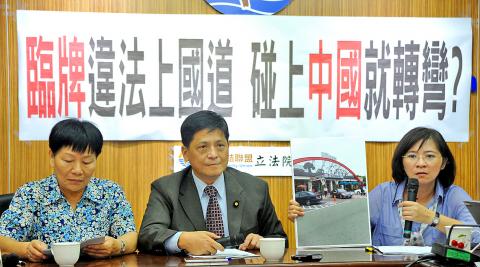The government yesterday promised to impose stricter regulations when reviewing applications to use China-registered vehicles in Taiwan, after a car from China’s Yunnan Province that was seen driving around the nation triggered controversy and criticism.
“Taiwanese laws do not permit cars from China to be on the nation’s roads in general. However, the owner of a car registered in China may apply for special permission from the Ministry of Economic Affairs [MOEA]. After permission is granted by the ministry, the owner needs to clear all tariffs and pay a deposit to the Ministry of Finance, before the Directorate-General of Highways can issue a provisional license to the car,” Mainland Affairs Council official Lee Pi-jen (李必仁) told a press conference.
Lee was answering a question by Taiwan Solidarity Union Legislator Lai Chen-chang (賴振昌) about a dark-red Mercedes-Benz with a Yunnan Province license plate that has been seen driving around the nation recently, creating a public uproar, as cars from China are not allowed to be on the road in Taiwan.

Photo: Liu Hsin-de, Taipei Times
Lai asked whether the owner of the vehicle was in violation of the law and whether the car’s presence could compromise national security.
Deputy Director-General of Highways Huang Yun-kui (黃運貴) said that the particular car, with the license plate number “Yun-A 378TW,” arrived in Taiwan via the Port of Taipei on July 2 and was issued provisional license plates twice, the first valid from July 9 to July 13, and the second from Sept. 12 to Sept. 16.
“We issued the provisional license plates after a nongovernmental organization applied for a provisional license and obtained permission from the MOEA’s Bureau of Foreign Trade,” Huang said. “As far as we know, it was completely within the law for the car to be on the road in Taiwan.”
A division chief from the bureau, Chang Chih-chung (張志忠), said that the Greater Tainan-based Dadongshan Association for Cross-strait Exchanges made the application for the car to be driven in Taiwan “for a special occasion.”
However, Chang was unable to answer when Lai asked what could be defined as “special occasion,” and promised to impose stricter regulations when reviewing future applications.
Lee dismissed rumors that cars from China would be allowed on Taiwanese roads from next month.
“Allowing Chinese cars to be driven around Taiwan would involve national security, road safety, as well as other risks,” Lee said.
“At the moment, conditions allowing Chinese cars to be driven on the nation’s roads do not exist and there is no room for them now,” he added.

Trips for more than 100,000 international and domestic air travelers could be disrupted as China launches a military exercise around Taiwan today, Taiwan’s Civil Aviation Administration (CAA) said yesterday. The exercise could affect nearly 900 flights scheduled to enter the Taipei Flight Information Region (FIR) during the exercise window, it added. A notice issued by the Chinese Civil Aviation Administration showed there would be seven temporary zones around the Taiwan Strait which would be used for live-fire exercises, lasting from 8am to 6pm today. All aircraft are prohibited from entering during exercise, it says. Taipei FIR has 14 international air routes and

Taiwan lacks effective and cost-efficient armaments to intercept rockets, making the planned “T-Dome” interception system necessary, two experts said on Tuesday. The concerns were raised after China’s military fired two waves of rockets during live-fire drills around Taiwan on Tuesday, part of two-day exercises code-named “Justice Mission 2025.” The first wave involved 17 rockets launched at 9am from Pingtan in China’s Fujian Province, according to Lieutenant General Hsieh Jih-sheng (謝日升) of the Office of the Deputy Chief of the General Staff for Intelligence at the Ministry of National Defense. Those rockets landed 70 nautical miles (129.6km) northeast of Keelung without flying over Taiwan,

The Ministry of National Defense (MND) today released images of the military tracking China’s People's Liberation Army (PLA) movements during the latest round of Chinese drills around Taiwan. The PLA began "Justice Mission 2025" drills today, carrying out live-fire drills, simulated strikes on land and maritime targets, and exercises to blockade the nation's main ports. The exercises are to continue tomorrow, with the PLA announcing sea and air space restrictions for five zones around Taiwan for 10 hours starting from 8:30am. The ministry today released images showing a Chinese J-16 fighter jet tracked by a F-16V Block 20 jet and the

City buses in Taipei and New Taipei City, as well as the Taipei MRT, would on Saturday begin accepting QR code payments from five electronic payment providers, the Taipei Department of Transportation said yesterday. The new option would allow passengers to use the “transportation QR code” feature from EasyWallet, iPass Money, iCash Pay, Jkopay or PXPay Plus. Passengers should open their preferred electronic payment app, select the “transportation code” — not the regular payment code — unlock it, and scan the code at ticket readers or gates, General Planning Division Director-General Liu Kuo-chu (劉國著) said. People should move through the